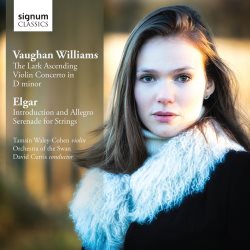|

|
Ralph VAUGHAN WILLIAMS (1872-1958)
Concerto for Violin and String Orchestra (1924-5) [18:13]
The Lark Ascending, Romance for Violin and Orchestra (1914, revised 1920) [16:48]
Sir Edward ELGAR (1857-1934)
Introduction and Allegro, Op.47 (1901) [13:50]
Serenade for Strings, Op.20 (1892) [8:34]
Tamsin Waley-Cohen (violin)
Orchestra of the Swan/David Curtis
rec.24 March 2014, St Augustine’s, Kilburn, London (Elgar); 28 March 2014, Cheltenham Town Hall, UK (Vaughan Williams). DDD
SIGNUM CLASSICS SIGCD399 [59:28]
As usual, British critics and reviewers have rushed to cover this issue with superlatives but even a cursory comparison with previous classic versions of the Elgar works here will demonstrate that these performances are simply nowhere near their quality. That is not say that Tamsin Waley-Cohen is not a superb violinist but she has been scuppered by three factors: slack, indifferent conducting, weak orchestral playing and the soloist’s decision in the “Introduction and Allegro” to tone down her vibrato to the point that her playing sounds flat and vapid.
I replayed both Barbirolli’s and Christopher Warren-Green’s accounts of the two Elgar string staples here and furthermore subjected other trusted ears to making comparison between them and these new recordings. They confirmed what I hear, that the opening of Op.47 is first jerky and aggressive, then subsides into a perfunctory mode in which nuances of phrasing and dynamics are ignored. The “Serenade” is similarly slack and lacking in the kind of care and tension with which Barbirolli infuses this glorious work. Orchestral ensemble is untidy, lacking crispness and definition and phrase re shapeless. The entry of the violin in the “introduction” is bewilderingly dull and unaffectionate, devoid of inner life as if Baroque HIP principles were being applied to this ripely Romantic music.
The sound in this new recording is crystalline but so forensic that the soloist’s breathing is obtrusive in “The Lark Ascending” and throughout this disc there is also too much rumbling ambient noise – air-conditioning? – which suddenly becomes noticeable by its absence when you reach the end of a track. The classic account of this and the Elgar pieces by Christopher Warren-Green, now a quarter of a century old, is rather too distantly recorded by modern standards, yet the Barbirolli barely seems to suffer from its supposed antiquity, there is so much vibrancy, energy and – yes - affection in his recordings. The “Lark” is in fact by far the most successful track here and we can hear ample evidence of Waley-Cohen’s virtuosity but she seems to lack the imagination and maturity to give us more than a technically brilliant account – but at least she re-admits some vibrato into her tone. In no sense does she conjure the magical serenity of famous versions by Hugh Bean or Iona Brown.
I have left consideration of the opening work, Vaughan Williams’ Violin Concerto, until last as it might for some constitute a better reason for acquiring this recording, but this brief work – under twenty minutes - has never been one of his most attractive or compelling of compositions. It is decently played and in the Adagio we hear some of the poetry lacking elsewhere but remains for me unmemorable and the orchestral playing is once again listless.
Ralph Moore
 |
 |
|



 All Nimbus reviews
All Nimbus reviews








